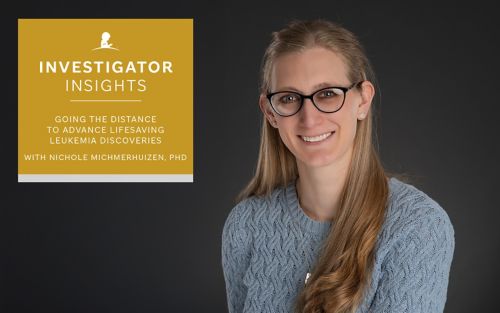St. Jude Family of Websites
Explore our cutting edge research, world-class patient care, career opportunities and more.
St. Jude Children's Research Hospital Home

- Fundraising
St. Jude Family of Websites
Explore our cutting edge research, world-class patient care, career opportunities and more.
St. Jude Children's Research Hospital Home

- Fundraising
Going the distance to advance lifesaving leukemia discoveries

Nicole Michmerhuizen, PhD, former St. Jude postdoctoral researcher in the lab of Charles Mullighan, MD, MBBS, studies high-risk pediatric acute myeloid leukemia (AML) with the goal of identifying new and more effective treatment options.
The challenges we face and overcome in life often critically shape who we are and what we are passionate about. My interest in biomedical research started in middle school when I was diagnosed with type 1 diabetes. Type 1 diabetes is an autoimmune condition where the body’s immune system attacks and destroys the cells in the pancreas that produce insulin. Everyone needs insulin because this hormone regulates blood sugar levels — without it, you can experience short-term symptoms such as weight loss and fatigue, as well as longer-term complications including heart disease and stroke.
To manage my type 1 diabetes, I take supplemental insulin throughout the day and night with the help of a small, wearable device. My firsthand experience of how effective medicines and treatments can impact someone’s life helped me realize the importance of biomedical research. Thanks to the availability of insulin, my type 1 diabetes hasn’t stopped me from pursuing my goals in academics, athletics or any other area.
In my undergraduate years, I attended Calvin University in Grand Rapids, Michigan, where I was a competitive runner participating in both cross country and track. Although I wasn’t a standout runner in high school, I improved dramatically during my college career. Fueled by support from my coaches and teammates, I was named a Division III All-American five times, including winning a national championship in the 10,000-meter run in 2013. During graduate school, I began to race longer distances. With the help of dedicated training and ideal race conditions, I qualified for and competed in the 2016 Olympic Team Trials for the marathon. My years of running were incredibly special and left me with lots of unforgettable memories, as well as some key life lessons.

Nicole Michmerhuizen, PhD, and her husband, Clarence Pascual, ran the 2024 St. Jude Marathon, continuing Nicole’s passion for running.
My experiences as a runner taught me about perseverance and determination, and they gave me the confidence to push beyond what I thought was possible, whether in running or another area of my life. My athletic success showed what I can achieve when I fully commit to a goal, even when the process is long or the outcome is uncertain. Both distance running and scientific research require countless hours of effort, resilience in the face of setbacks and a willingness to try, fail and keep trying until you succeed. Indeed, the principles that shaped my experience as a competitive runner have also been critical to my career in biomedical research.
Inspired by translational research
I attended graduate school at the University of Michigan, where I was first able to participate in translational research. It was inspiring to learn about and participate in research that moves potential therapies from the lab to the clinic, where they can make a real difference for patients. This was particularly striking for me given my experience with type 1 diabetes.
As a PhD student, I studied head and neck cancer, and it was during this time that I became increasingly interested in the field of cancer research. From there, I came to St. Jude as a postdoc in the lab of Charles Mulligan, MD, MBBS, St. Jude Department of Pathology. At St. Jude, my research focused on a high-risk subset of pediatric acute myeloid leukemia (AML) patients with a gene fusion involving NUP98. My work involved developing experimental models to study the biology of this fusion between genes, which allowed us to identify important protein interactions that drive the disease. Building on these discoveries, we explored drugs that could target and inhibit these key interactors, with the goal of identifying new and more effective treatment options for leukemia patients with NUP98 fusions.
Building on my research successes at St. Jude, I was able to recently accept a faculty position at the University of Rochester, where I will run my own laboratory. The scientific environment at St. Jude provided me with outstanding opportunities for research and professional development, along with invaluable mentorship and support. My research also would not have been possible without close collaborations with other researchers at St. Jude and with investigators at other institutions. Taken together, the resources, mentorship and collaborative culture at St. Jude were instrumental in preparing me for my independent research career.
Continuing the marathon of discovery
As I begin this new chapter in my career, I’m excited to continue the journey of discovery: one that began with personal experience, grew through perseverance and has been shaped by the support and collaboration of so many mentors and colleagues. I’m motivated by the potential to make a meaningful impact for patients and families facing leukemia and other cancers, and I hope to keep pushing research toward better treatments and brighter futures.






